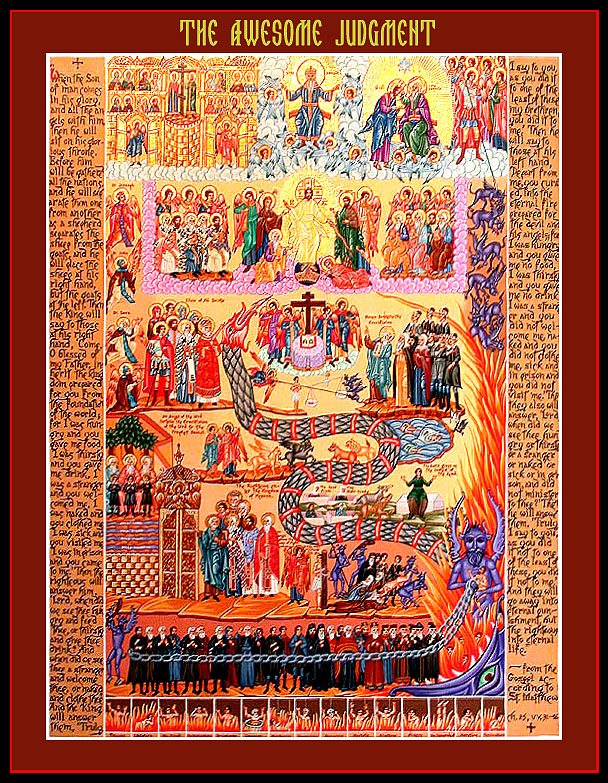
-The Awesome Judgement — icon of the Second Coming. From Christ a river flows forth: it is radiant like a golden light at the upper end of it, where the saints are. At its lower end, the same river is fiery, and it is in that part of the river that the demons and the unrepentant are depicted.

-by Trent Horn
“The prolific author and Eastern orthodox theologian David Bentley Hart has just released a new book that covers a very old topic: Universalism, or the belief that all creatures will definitely be saved. In his new book That All Shall Be Saved: Heaven, Hell, and Universal Salvation, Hart argues that eventually all people (which may include fallen angels, though Hart doesn’t explicitly come out and say it) will spend eternity with God in heaven. That’s because an eternal hell is supposedly so unjust that if it were an essential part of Christian doctrine it would be (in Hart’s words) “proof that Christianity should be dismissed as a self-evidently morally obtuse and logically incoherent faith.” (As an aside, my colleague Karlo Broussard has done some great work showing hell is not unjust.)
The possibility that hell is empty is not a twenty-first century novelty. In the third century, the ecclesial writer Origen argued for apokatastasis, or a “restoration” that would unite all things, including unrepentant sinners, to God. This would seem to rule out the possibility that anyone would spend an eternity in hell, though modern commenters are divided over the implications of Origen’s theology on this question. According to Bible scholar Richard Bauckham:
“Until the nineteenth century almost all Christian theologians taught the reality of eternal torment in hell. Here and there, outside the theological mainstream, were some who believed that the wicked would be finally annihilated. . . . Even fewer were the advocates of universal salvation . . . though these few included some major theologians of the early church.”
The Catholic Church condemned universalism at the regional council of Orange in 543 AD, though a few theologians still held out hope for all creatures to be saved. This uniformity of thought began to change, however, with the rise of denominations like the Universalist Church of America (which exists today under the name Unitarian Universalism).
Most Christian universalists like Hart agree that hell is real and even believe that some or many people will go there. But from their perspective hell is a temporary “purgatory-like” condition and the Bible’s references to it being “eternal” only mean hell is a temporary punishment that the damned face in “the age to come” because the Greek word for eternity (aionion) can also mean “age” (Hart even refers to hell as “the purifying flames of the Age to come”).
As I’ve shown in my engagements with others who dispute the eternal aspect of hell, the endless nature of hell is quite obvious from the biblical texts. Given the strength of the Catholic Church’s case, universalists can’t just claim that the punishments of hell might not be permanent. To be convincing, they need to show positive evidence that all people will eventually be saved. When it comes to providing positive evidence, universalists usually cite biblical passages that, from their perspective, describe God effecting the salvation of every single person.
Hart seems puzzled, though, that these passages were not given more attention by theologians throughout the Church’s history, noting “how odd it is that for at least fifteen centuries such passages have been all but lost behind a veil as thin as the one that can be woven from those three or four deeply ambiguous verses that seem (and only seem) to threaten eternal torments for the wicked.”
But perhaps that’s because these passages don’t teach that everyone will be saved. Instead, they express the hope that anyone can be saved.
In 1 Timothy 2:4, for example, St. Paul says that God “desires all men to be saved and to come to the knowledge of the truth.” But God also desires that we not sin, and yet we still do. God desires the good for all of his creatures, but because he has also given human beings and angels the gift of free will, it follows that God will allow us to enjoy or suffer the consequence of this good gift, even if it means eternal separation from him.
Although Hart admits he doesn’t like “reducing biblical theology to concentrated distillates (prooftexts)” he proceeds to do just that by listing nearly a dozen verses, including their original Greek and Hart’s own rendering of them from his own strange, overly-literal translation of the Bible. Unfortunately, his translation doesn’t offer much in terms of exegesis or understanding of these crucial texts.
For example, in 1 Corinthians 15:22 Paul says, “For as in Adam all die, so also in Christ shall all be made alive,” but this doesn’t mean that through Christ all people shall be brought to eternal life. What it means is that all who are “in Christ” (a phrase Paul often uses for the saved or elect) shall be brought to eternal life. This logic also explains Romans 5:18, wherein Paul says, “As one man’s trespass led to condemnation for all men, so one man’s act of righteousness leads to acquittal and life for all men.”
This refers to life for all believers, or those who are in Christ. We know this because in the previous verse Paul says, “If, because of one man’s trespass, death reigned through that one man, much more will those who receive the abundance of grace and the free gift of righteousness reign in life through the one man Jesus Christ.” This is talking about the salvation of all believers, not the salvation of all people. Jesus himself says that he will “draw all men to himself” (John 12:32), but that doesn’t mean that people can’t reject him even after being so drawn. In this passage Jesus also foreshadows his own crucifixion, which may mean that all people will have their sins atoned for on the cross but the grace that Christ accrues for them may not be applied to their souls if they choose to reject it.
In other words, Christ draws all men to Himself and He died for every single person, offering them the gift of eternal life. But each person still has a choice, and some people will tragically refuse to accept Christ’s mercy and salvation. That is why the Church prays for the soul of anyone who has perished: because God is “not wishing that any should perish, but that all should reach repentance” (2 Pet. 3:9).
If Hart’s universalism is true, then those who reject the gospel would cease to be “the lost” Jesus came to save (Luke 19:10) and become instead “the delayed,” who just have to wait a little longer for the heavenly rewards they rejected in life.
The evangelist who foolishly thinks universalism will make it easier to preach the gospel will see that without the “bad news” the “good news” isn’t taken seriously. On this view, Christianity becomes a faith that seeks to merely make “heaven on earth,” and by that point it’s nothing more than secular humanism playing dress-up on Sundays.
Contrary to Hart’s assertion, it is not the presence of hell that makes Christianity a “morally obtuse and logically incoherent faith”— it is its absence.”
Love, His will be done!!
Matthew
